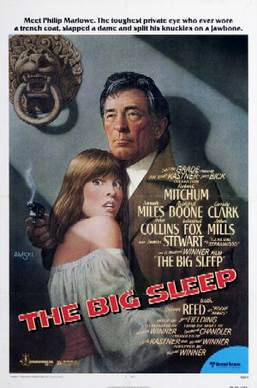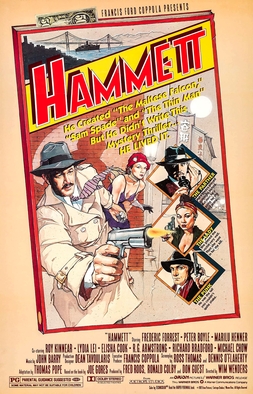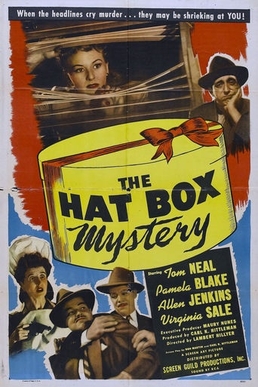Related Research Articles

Film noir is a cinematic term used primarily to describe stylized Hollywood crime dramas, particularly those that emphasize cynical attitudes and motivations. The 1940s and 1950s are generally regarded as the "classic period" of American film noir. Film noir of this era is associated with a low-key, black-and-white visual style that has roots in German Expressionism cinematography. Many of the prototypical stories and attitudes expressed in classic noir derive from the hardboiled school of crime fiction that emerged in the United States during the Great Depression.

Richard Ewing Powell was an American actor, singer, musician, producer, director, and studio head. Though he came to stardom as a musical comedy performer, he showed versatility and successfully transformed into a hardboiled leading man, starring in projects of a more dramatic nature. He was the first actor to portray private detective Philip Marlowe on screen.
Halifax f.p. is an Australian television crime series produced by Nine Network from 1994 to 2002. The series stars Rebecca Gibney as Doctor Jane Halifax, a forensic psychiatrist (f.p.) investigating cases involving the mental state of suspects or victims. The series is set in Melbourne.

State of Grace is a 1990 American neo-noir crime drama film directed by Phil Joanou and starring Sean Penn, Ed Harris and Gary Oldman, also featuring Robin Wright, John Turturro, and John C. Reilly. Written by playwright Dennis McIntyre, the film was produced by Ned Dowd, Randy Ostrow, and Ron Rotholz, with a musical score by Ennio Morricone.

The Big Combo is a 1955 American crime film noir directed by Joseph H. Lewis, written by Philip Yordan and photographed by cinematographer John Alton, with music by David Raksin. The film stars Cornel Wilde, Richard Conte and Brian Donlevy, as well as Jean Wallace, who was Wilde's wife at the time. The supporting cast features Lee Van Cleef, Earl Holliman and the final screen appearance of actress Helen Walker.

The Big Sleep is a 1978 neo-noir film, the second film version of Raymond Chandler's 1939 novel of the same name. The picture was directed by Michael Winner and stars Robert Mitchum in his second film portrayal of the detective Philip Marlowe. The cast includes Sarah Miles, Candy Clark, Joan Collins and Oliver Reed, and features James Stewart as General Sternwood.

Mulholland Falls is a 1996 American neo-noir crime thriller film directed by Lee Tamahori, written by Pete Dexter, and starring an ensemble cast featuring Nick Nolte, Jennifer Connelly, Chazz Palminteri, Michael Madsen, Chris Penn, Melanie Griffith, Andrew McCarthy, Treat Williams, and John Malkovich.
John Flaus is an Australian actor.
The WEA Sydney Film Society is a nonprofit film society based in Sydney, Australia. It is a club of WEA Sydney, which is part of the Workers' Educational Association.

Hammett is a 1982 American neo-noir mystery film directed by Wim Wenders and executive produced by Francis Ford Coppola. The screenplay was written by Ross Thomas and Dennis O'Flaherty, based on the novel of the same name by Joe Gores. It stars Frederic Forrest as detective story writer Dashiell Hammett, who gets caught up in a mystery very much like one of his own stories. Marilu Henner plays Hammett's neighbor, Kit Conger, and Peter Boyle plays Jimmy Ryan, an old friend from Hammett's days as a Pinkerton agent. The film was entered into the 1982 Cannes Film Festival.

London Belongs to Me is a British film released in 1948, directed by Sidney Gilliat, and starring Richard Attenborough and Alastair Sim. It was based on the novel London Belongs to Me by Norman Collins, which was also the basis for a seven-part series made by Thames Television shown in 1977.

Tech-noir is a hybrid genre of fiction, particularly film, combining film noir and science fiction, epitomized by Ridley Scott's Blade Runner (1982) and James Cameron's The Terminator (1984). The tech-noir presents "technology as a destructive and dystopian force that threatens every aspect of our reality".

Sunset Grill is a 1993 American neo-noir mystery film directed by Kevin Connor and starring Peter Weller as a private detective in Los Angeles. It co-stars Lori Singer and Stacy Keach.

It Always Rains on Sunday is a 1947 British film adaptation of Arthur La Bern's novel of the same name, directed by Robert Hamer. The film has been compared with the poetic realism movement in the French cinema of a few years earlier by the British writers Robert Murphy and Graham Fuller.

Winter of Our Dreams is a 1981 Australian drama film directed by John Duigan. Judy Davis won the Best Actress in a Lead Role in the AFI Awards for her performance in the film. The film was nominated in 6 other categories also. It was also entered into the 13th Moscow International Film Festival where Judy Davis won the award for Best Actress.

The Interrupted Journey is a 1949 British thriller film directed by Daniel Birt and starring Valerie Hobson, Richard Todd, Christine Norden and Tom Walls. The railways scenes were shot at Longmoor in Hampshire. The film includes a train crash occurring after someone pulls the emergency cord, as had happened in the Winsford train crash the previous year.
Hungry Heart is a 1987 Australian film about a love affair that goes wrong.
Jigsaw is a 1989 thriller film starring Rebecca Gibney.
The Last Outlaw is a 1980 Australian four-part television miniseries based on the life of Ned Kelly. It was shot from February to May 1980 and the end of its original broadcast, in October–November 1980, coincided with the centenary of Ned Kelly's death.

The Hat Box Mystery is a 1947 mystery film directed by Lambert Hillyer and starring Tom Neal, Pamela Blake and Allen Jenkins. It was produced as a featurette for release by Robert L. Lippert's Screen Guild Productions. It was shot at the General Service Studios in Hollywood. The film's sets were designed by the art director William Glasgow.
References
- 1 2 3 Ward, Susan (2003). "Disparate Orders". Metro (Melbourne). No. 135. St Kilda: The Australian Teachers of Media Inc. p. 145.
- ↑ David Stratton, The Avocado Plantation: Boom and Bust in the Australian Film Industry, Pan MacMillan, 1990 p. 236
- ↑ Ed. Scott Murray, Australia on the Small Screen 1970-1995, Oxford Uni Press, 1996 p. 18
- ↑ "Appendix R: Film Production", Annual Report, Parliamentary paper (Australia. Parliament) (1984/1985, PP no. 443 of 1985), Canberra: Australian Govt. Pub. Service, 1977, ISSN 0816-9624, nla.obj-1277757954, retrieved 21 December 2023– via Trove
- ↑ Queensland images in film and television. University of Queensland Press. 1990. p. 144. ISBN 978-0-7022-2331-0.
- ↑ "The company of eccentrics". Filmnews . Vol. 18, no. 11. New South Wales, Australia. 1 December 1988. p. 6. Retrieved 21 December 2023– via National Library of Australia.